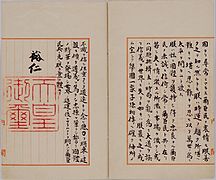Gyokuon-hōsō

In the radio address Gyokuon-hōsō ( Japanese 玉 音 放送 , German about: "Transmission of the imperial voice") Tennō Hirohito read the "Imperial Decree to End the Great East Asian War " ( 大 東 亜 戦 争 終結 ノ 詔書 , Daitōa sensō shūketsu no shōsho ). It was the first public broadcast of the Tennō's voice. With his decree, he instructed the Japanese government to accept the Potsdam Declaration , which called for the unconditional surrender of Japan in World War II . Since the emperor did not explicitly mention the capitulation, but only spoke of accepting the Potsdam Declaration, there was confusion among the Japanese people as to whether Japan had actually capitulated. The speech was broadcast at noon Japanese time on August 15, 1945, shortly after the Battle of Okinawa , nine days after the atomic bombing of Hiroshima and six days after the one on Nagasaki . In addition, a week earlier the Soviet Union had entered the war against Japan . The emperor mentioned the bombing, but not the Soviet victories in Manchuria .
The speech was a recording made the day before in the Imperial Palace . Considered dishonorable to end the war in this way, many Japanese military officials attempted a coup on the night of August 14-15 . Under false orders, Hatanaka Kenji , one of the chief conspirators, had the imperial palace occupied on the evening of that day in order to destroy the record; however, this was not found.
The official English translation of the speech differs from the original Japanese version in that the last sentence has been omitted. This contains in a sharp command tone the instruction to obey the edict.
The text can be read from right to left:
Pages 4 and 5 (text; signature and seal of Hirohito)
Full text
“To our good and loyal subjects.
After thinking deeply about the general developments in the world and the actual conditions that prevail in Our Kingdom, We have decided today to rectify the present situation by resorting to an extraordinary measure.
We have directed Our Government to notify the Governments of the United States, Great Britain, China and the Soviet Union that Our Empire accepts the terms of their joint declaration.
Striving for the common prosperity and happiness of all nations, and the safety and well-being of our subjects, is the solemn commitment passed on to Us from Our Imperial Ancestors and which is close to our hearts.
Indeed, We declared war on America and Great Britain, since Our sincere desire was to ensure Japan's self-preservation and the stabilization of East Asia, far from violating the sovereignty of other nations as well as pushing for territorial expansion.
But now the war has lasted almost four years. In spite of the best done by all - the valiant struggle of the land and naval forces, the diligence and diligence of Our civil servants, and the devoted service of Our One Hundred Million People - the war situation has not necessarily turned to the advantage of Japan, while the general one Developments in the world have turned against his interest.
In addition, the enemy has begun to use a new and terribly cruel bomb, the destructive power of which is truly immeasurable and which claims many innocent lives. Continuing the struggle would not only lead to the ultimate collapse and annihilation of the Japanese nation, but also to the complete annihilation of human civilization.
In this situation, how should We save our millions of subjects or answer ourselves to the holy spirits of our imperial ancestors?
This is why We have ordered that the provisions of the Joint Declaration of the Powers be accepted.
We cannot help but express our deepest regrets towards the Allied Nations of East Asia who have worked tirelessly with the Empire for the emancipation of East Asia.
The thought of these officers and soldiers, as well as others who fell on the battlefields, those who died in their posts of duty, or those who met an early death, and their grieving families, hurts Our hearts day and night.
The well-being of the wounded and the war victims and those who have lost their homes and livelihoods are our deep concern.
The hardships and sufferings that await Our nation in the future will certainly be great. We are fully aware of the innermost feelings of all of you, our subjects. But it is in keeping with the dictates of time and fate that We have decided to pave the way for all future generations to a great peace by enduring the unbearable and the intolerable.
We were able to preserve the structure of the imperial state and are always with you, our good and loyal subjects, counting on your sincerity and integrity.
Beware of any emotional outbursts that may create unnecessary complications, or fraternal arguments and strife that may create confusion, mislead, and cause you to lose faith in the world.
Let the whole nation continue to endure as a family from generation to generation, always firm in its belief in the immortality of its holy land, and mindful of the heavy burden of its responsibilities and the long road that lies ahead.
Unite all your strengths dedicated to building the future. Cultivate the ways of righteousness, consolidate the nobility of spirit and work with devotion - so that you can strengthen the innate glory of the imperial state and keep pace with the progress of the world. "
Individual evidence
- ↑ 玉 音 放送 ( Memento from October 11, 2011 in the Internet Archive )
literature
- Gerhard Krebs : The capitulation of Japan and the dropping of the atomic bombs. In: Periplus 1995. Yearbook for Non-European History. 5th year, Münster, LIT 1996, pp. 34-52. (contains a German translation of the broadcast address)



